by Niki Crawson | Oct 9, 2015
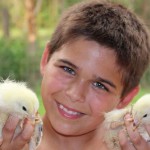
Noah, a Holmes County 4-H member, is learning responsibility through the 4-H Chick Chain project.
Regardless of the age-old debate, “which came first, the chicken or the egg?” one thing is certain- raising chickens is a big responsibility. One of the newest and most creative ways that some of our Florida 4-Hers are learning the importance of being responsible is through the 4-H Chick Chain pilot program.
This year, six counties in the Florida Panhandle partnered with Alabama 4-H to offer the Chick Chain program. The goal of this project is to help youth learn life and workforce skills while learning how to raise and show chickens. Thirty-six Florida 4-H members chose to take on the responsibility of raising 18, two-day old chicks from May through October. Over the course of the program, youth participated in workshops to learn how to care for their chicks, keep records of their project, and how to prepare their animals for a show. This past Saturday marked the culminating event of the project when youth participated in a show and auction in Ozark, AL. During this event, youth competed in a showmanship competition, record book competition, and poultry quiz. All three events counted towards their overall score.
Members also had a short course in entrepreneurship- they were required to meet with potential buyers and market their hens. Life skills were clearly present in every aspect of the 4-H Chick Chain program which aided youth in the further development of not only responsibility but also confidence, capability, and compassion. When asked about his experiment, Noah, a Holmes County 4-Her shared:
“Chick Chain is a great opportunity to learn about responsibility and respect for other people and animals. You get to raise 18 of your very own chickens for a couple months and then get to take them to a show with your fellow 4Her’s to compete for ribbons and money. You also learn about proper sportsmanship. I love it!”
Based on participant’s feedback, we will be expanding the pilot next year and making some exciting programmatic changes. Holmes County 4-H parent and club leader, Jewellyn Owens, was instrumental in developing the Chick Chain pilot for Florida because she saw the potential this program had to help youth learn valuable life skills while increasing their knowledge about agriculture. Jewellyn shares:
“My family Loves Chick Chain. It is a great program for children wanting to do a 4-H livestock program but their parents don’t feel they are ready yet or can’t afford the cost of the larger livestock. Chick Chain has taught my children respect, sportsmanship, caring for another living creature and responsibility. My children love seeing their chicks grow from 2 day chicks to full grown egg laying chickens. Best part is getting to eat their chicken’s eggs. I also feel it teaches them other aspects of life like record keeping, writing, leadership skills, financial responsibility all things that will help them years down the road.”
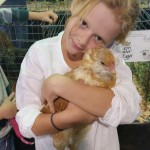
4-Hers spent 6 weeks learning how to care for their chicks, biosecurity, showmanship, and recordkeeping.
If you would like to help 4-H grow responsibility in your community (through this program or others) consider becoming a 4-H volunteer. For more information about becoming a volunteer, or to find out about next year’s 4-H Chick Chain program, contact your local UF IFAS County Extension Office. We are also looking for sponsors to help expand this program.
For more information, check out:
by Stefanie Prevatt | May 29, 2015
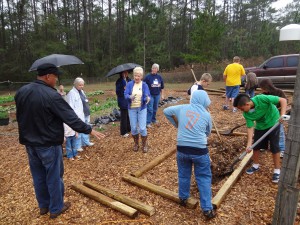
Photo credit: Zulema Wibmer, 4-H Program Assistant, Leon County 4-H Office
Garden-based education is taking America by storm. While this is concept dates as far back as the seventeenth century, it certainly feels like the popular movement of the day. 4-H has been using garden based education since 1902 with tomato and corn clubs to teach life skills such as resiliency, planning and organizing, and communication. These same skills are necessary to become a successful entrepreneur:
Resiliency: the ability to try again after failure. A garden is the perfect place for youth to test ideas or try new things. As adults, we know that sometimes the key to success is (safe) failure! If you are using a garden your classroom, allow creative experimentation. Success will build on itself and trials that missed the mark will make for more lively discussion and group cohesion.
Planning/organizing: the process of figuring out what to do (planning) and how to do it (organizing). Whether you are starting new or continuing an existing project, allowing the expression of youth ideas and goals – followed by their help implementing these plans – is crucial to your project’s success. Remember, we can grow all the vegetables in the world, but if the youth don’t learn or feel a sense of accomplishment related to the project, all we did was grow vegetables.
Communication: the exchange of thoughts, messages, or information, as by speech, signals, writing, or behavior. In today’s tech savy world, we are losing the ability to communicate in person and in writing. You have a unique opportunity to work with your group together, or as individuals, to discuss (or write descriptively) about your garden.
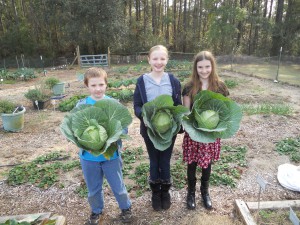
Photo credit: Zulema Wibmer, 4-H Program Assistant, Leon County 4-H Office
UF IFAS Extension offers many resources to help both youth and adults become entrepreneurs in the food industry. Food entrepreneurship has really exploded with the Cottage Food Law. Many County Extension Offices offer workshops and seminars on food entrepreneurship, and there are also some great online resources to help you get started:
If you have a green thumb, consider going “totally green” as a 4-H gardening volunteer or Master Gardener. 4-H needs caring adults like you to share their knowledge and passion for gardening with the next generation. Through the 4-H gardening project, youth not only learn gardening knowledge and skills, they also learn responsibility, teamwork, and other life skills that will help them grow up to be compassionate and competent citizens. To get involved, contact your local UF IFAS Extension Office, or visit http://florida4h.org./volunteers.
Your opinion matters! Please provide feedback on this short survey to help us improve our blog: https://ufl.qualtrics.com/SE/?SID=SV_3gtLKjqia3F75QN
by Jena Gilmore | Mar 13, 2015
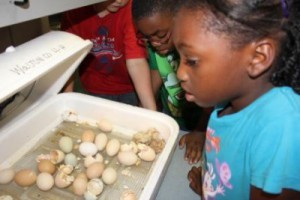 The 4-H embryology project focuses on the science of embryology, which is a branch of biology that deals with the development of an embryo from the fertilization of the ovum to the fetus stage. This 4-H project is often conducted in elementary schools, but can also be done as part of a 4-H club project. 4-H volunteers, or project leaders, help youth set up incubators filled with fertilized eggs and teach them how to maintain adequate conditions for the incubators. While waiting for the eggs to hatch, youth learn the science of how embryos develop. Finally the day they’ve all been waiting for…HATCH DAY! Students and teachers experience a day of melodious chirping, fluffy chicks pecking about, and if they’re lucky they may even see a few hatching in action. While this day is bittersweet, who says the 4-H Embryology Project experience has to end here?
The 4-H embryology project focuses on the science of embryology, which is a branch of biology that deals with the development of an embryo from the fertilization of the ovum to the fetus stage. This 4-H project is often conducted in elementary schools, but can also be done as part of a 4-H club project. 4-H volunteers, or project leaders, help youth set up incubators filled with fertilized eggs and teach them how to maintain adequate conditions for the incubators. While waiting for the eggs to hatch, youth learn the science of how embryos develop. Finally the day they’ve all been waiting for…HATCH DAY! Students and teachers experience a day of melodious chirping, fluffy chicks pecking about, and if they’re lucky they may even see a few hatching in action. While this day is bittersweet, who says the 4-H Embryology Project experience has to end here?
That is the exact question that Walton County 4-Her Justin Bolen asked himself when he got involved in the 4-H embryology project. At age 9, Justin stepped up and expanded his 4-H poultry project into a business. He discovered a demand for free range chicken eggs in his local community and build his business around filling that need. Justin took out a loan with his family to purchase the necessary equipment to start his own business. He learned skills such as feed management, environment maintenance, record keeping, health care for poultry, and effects on hatch rate.
Justin’s passion wasn’t only 4-H and poultry, but also to learn how to maintain a debt free business. He repaid his loan to his
family by age 11 and was producing 100 dozen eggs per month. At age 13, Justin used his “egg money” to purchase his first horse, Brave, for $1500. Just two years later (as his riding skills advanced) Justin sold Brave and used that money along with more “egg money” to purchase a Lambert Morgan Horse, named Trey, for $4,200. In January 2014, Justin was the first 16 year old to be approved to participate in Chris Cox’s Colt Starting Clinic, for which he again paid tuition of $1,400 with his “egg money.”
Today, at age 17, Justin currently has 22 customers with a whopping 47 dozen eggs per delivery every other week. In order to give back to 4-H, Justin has agreed to provide the Walton County 4-H Embryology Project with fertilized eggs to support the program throughout the county so that other youth can not only learn about the science of embryology, but the business opportunities as well! Justin’s success story is proof that with “EGG-ceptional” dedication and determination, other youth can have the same experience he did in 4-H and become an entrepreneur themselves!
As a 4-H volunteer, you can share your personal interests and expertise in a variety of subjects including gardening, shooting sports, robotics, animal science, sewing/crafting, public speaking, foods and nutrition, and much more. In 4-H, you can leverage your experience and skills to help a young person find their own passions and interests and possibly even ignite a future career! 4-H is an opportunity we wish every young person could have because research shows it is a step forward. More than 60 million of our nation’s most successful statesmen, business leaders, and scientists credit 4-H with setting them on a positive, productive path. When you share your experiences with 4-Hers, you make a difference by helping youth become caring and competent citizens with a desire to contribute to their communities. To find out how to become a 4-H volunteer, contact your local extension office or visit http://florida4h.org/volunteers.
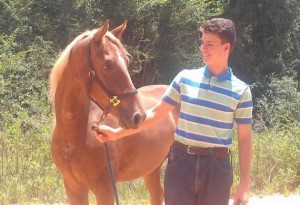
Justin and his horse, Trey.
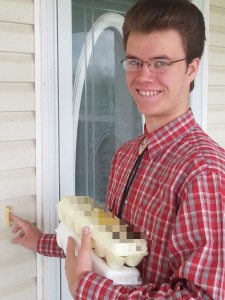
Justin delivering eggs to customers.
This article was written by Jena Brooks, Walton County 4-H Agent brooks15@ufl.edu.







